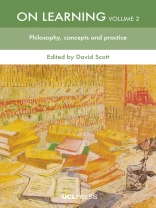This edited book, as you can see from its title, is about learning, or at least about the concept and practice of learning. The contributors to this volume are focusing on two meta-concepts, knowledge and learning, on the relationship between the two, and the way these can be framed in epistemic, social, political and economic terms. Knowledge and learning, as meta-concepts, are positioned in various networks or constellations of meaning, principally: the antecedents of the concepts, their relations to other relevant concepts, and the way the concepts are used in the lifeworld.
In this book the various authors explore a number of important concepts that are relevant to the idea of learning. These are meta-concepts such as epistemology, inferential role semantics, phenomenology, rationality, thinking, hermeneutics, critical realism and pragmatism, and meso-concepts such as probability, woman, training, assessment, education, system, race, friendship, Bildung, curriculum, ecology and pedagogy. Like David Scott’s first volume of On Learning, this collection focusing on philosophy, concepts and practices is a response to empiricist and positivist conceptions of knowledge. It challenges detheorised and reductionist ideas of learning that have filtered through to the management of our schools, colleges and universities; over-simplified messages about learning, knowledge, curriculum and assessment; and fostered the denial that values are central to understanding how we live and how we should live – the normative dimension to social policy and social theorising. This book is also an attempt at a Bildungstheorie.
Inhaltsverzeichnis
List of figures and tables
List of contributors
Preface
1 The concept and practice of learning
David Scott
Part One: Meta-concepts
2 Learning as ‘the way of the self’ or learning in pedagogical relationships
Tone Saevi
3 Rationality, reasons and learning
David Scott
4 Pragmatism, anti-representationalism and learning
Henrik Rydenfelt
5 A Bildungstheorien of learning
David Scott
6 Exploring learning in critical realism
Robert Isaksen
7 Learning systems and values
Bushra Sharar
Part Two: Meso-concepts
8 Learning categories and orders: training, education, assessment, woman and probability
David Scott
9 Hannah Arendt and Heinrich Blücher: learning together
Jon Nixon
10 Curriculum knowledge: a critique of the powerful knowledge discourse
Alex Moore with David Scott
11 Learning, higher education and the University: an ecological approach
Ronald Barnett
12 Feminist pedagogies Sandra Leaton Gray
13 A play-pedagogy
David Scott
14 Thingful learning: towards an object-oriented pedagogy
Søren Bengtsen
15 Some concluding thoughts about learning
David Scott and Bushra Sharar
Index
Über den Autor
David Scott is Emeritus Professor of Curriculum, Learning and Assessment at the IOE, UCL’s Faculty of Education and Social Science. His most recent books include: On Learning: A General Theory of Objects and Object-relations, UCL Press; (with B. Scott) Equalities and Inequalities in the English Education System, University College London, Institute of Education Press; and (with S. Leaton Gray) Women Curriculum Theorists: Power, Knowledge and Subjectivity, Routledge.












